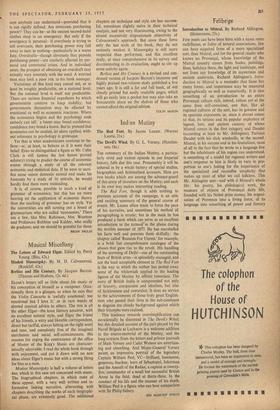Musical Miscellany
The Letters of Edward Eiger. Edited by Percy Young. (Bles, 42s.) Modest Mussorgsky. By M. D. Calvocoressi. (Rockliff, 42s.) Berlioz and His Century. By Jacques Barzun. (Thames and Hudson, 12s. 6d.) ELGAR'S letters tell us little about his music or his conception of himself as a composer. Occa- sionally there is a glimpse, as when he says that the Violin. Concerto is 'awfully emotional; too emotional but I love it,' or in rare words of shrewd musical advice to others. The rest is all the other Elgar—the keen literary amateur, with an excellent natural style, and Elgar the friend of his friends, a witty and likeable correspondent, direct but tactful, always hitting on the right word and tone, and completely free of the imagined starchiness and social self-consciousness. His reasons for urging the continuance of the office of Master of the King's Music are character- istically admirable. I read the whole book through with enjoyment, and put it down with no new ideas about Elgar's music but with a strong liking for him as a man.
Modest Mussorgsky is half a volume of letters too, which in this case are concerned with music. The biographical chapters, in which most of these appear, with a very well written and in- formative linking narrative, alternating with chapters describing the works of each biographi- cal phase, are extremely good. The additional
chapters on technique and style are less success- ful, sometimes slightly naive in their technical analysis, and not very illuminating, owing to the almost excessively dispassionate objectivity of Calvocoressi's approach. But since these form only the last sixth of the book, they do not seriously weaken it. Mussorgsky is still more respected than performed, and this excellent study, at once comprehensive in its survey and discriminating in its evaluation, ought to stir up some activity again.
Berlioz and His Century is a revised and con- densed version of Jacques Barzun's immense and highly praised two-volume study published a few years ago. It is still a fat and full book, of 448 closely printed but easily readable pages, which will go easily into a pocket but may also take an honourable place on the shelves of those who cannot afford the original edition.
COLIN MASON


































 Previous page
Previous page